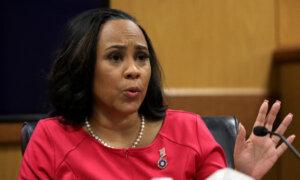Ms. Willis is contesting allegations that she financially benefited from hiring attorney Nathan Wade, who was at one point a romantic partner.
After a two-day hearing over a motion to disqualify Fulton County District Attorney Fani Willis from the high profile racketeering case naming former President Donald Trump, Fulton County Superior Court Judge Scott McAfee has to sort out remaining issues with privileged evidence, call attorneys back to conference, and issue an order.
President Trump was indicted last August alongside 18 codefendants, four of whom have since taken guilty pleas for allegedly violating state racketeering laws with their efforts to challenge the 2020 election results.
In January, attorney Ashleigh Merchant, representing codefendant Michael Roman, filed a motion to disqualify Ms. Willis, alleging a conflict of interest in her hiring of the lead prosecutor.
Nathan Wade, an attorney with his private law practice, was appointed special prosecutor in the case.
Ms. Merchant alleged Ms. Willis and Mr. Wade began dating before she hired him, as early as 2019, and that Ms. Willis benefited financially from the situation because Mr. Wade spent thousands on “lavish” vacations with Ms. Willis after his appointment.
Defendants had to show that there was a conflict of interest and that Ms. Willis benefited financially from the hiring of Mr. Wade to warrant disqualification.
These are the key takeaways from the hearing.
Timeline Dispute
Undisputed is the fact that Ms. Willis and Mr. Wade first met at a judicial conference in 2019. Mr. Wade was teaching a class to new judges, and Ms. Willis was not in his class but was at the conference as a judge.
Robin Yeartie, a former friend of Ms. Willis’s, said Ms. Willis had told her about meeting Mr. Wade at this conference, and that they started dating soon after.
She said she had seen Ms. Willis and Mr. Wade together on multiple occasions, and that she had “no doubt” they were dating. Asked for examples of this behavior, she answered “hugging, kissing, just affection.”
This testimony directly contradicted what Ms. Willis and Mr. Wade testified after Ms. Yeartie on Feb. 15.
According to both Ms. Willis and Mr. Wade, they met in 2019 and exchanged contact information, and spoke a few more times by phone that year. They spoke much more “often” by phone in 2020, and met up as well.
Mr. Wade said it started with Ms. Willis calling him for advice; he had a judgeship and private practice, and she was thinking of starting her own private practice as well. She ran for district attorney that year.
In November 2021, Ms. Willis contracted Mr. Wade for the first time. He signed a new contract with Ms. Willis in November 2022, for the special prosecutor role in the election case.
The two both testified that they began dating early 2022, and that the relationship ended the summer of 2023. They both testified that Mr. Wade had never stayed in Ms. Willis’s home, and they never lived together. They both testified that they took trips and vacations together in 2022 and 2023.
Ms. Yeartie met Ms. Willis in college, and said they remained “good friend[s]” and saw each other regularly.
Ms. Yeartie had a lease on a condo that she later rented out to Ms. Willis in April 2021, because Ms. Willis’s South Fulton home address had been doxxed and she was being harassed.
Ms. Yeartie also worked as a press aide in the district attorney’s office, and later resigned because she was put in a new department she didn’t like, and said this coincided with a falling out with Ms. Willis.
“We never spoke after that,” Ms. Yeartie said.
No Record of Reimbursements
While Mr. Wade and Ms. Willis were in a romantic relationship, they took several trips that were disclosed in court filings.
These include a trip to Napa Valley, California, two trips to Aruba with one involving a cruise,and a trip to Belize. Mr. Wade said while they were dating, they went on several day trips as well, where they would drive across state lines to get lunch in Tennessee, or Alabama, because it was difficult for Ms. Willis to have peace of mind in Georgia where people would interrupt them at restaurants.
Defense attorneys argued expenses covering Ms. Willis’s portion of the trips totaled to some $10,000, but state attorneys argued this was not accurate.
Both Mr. Wade and Ms. Willis testified that she paid him back for all of these trip expenses, and one reason Mr. Wade did the booking was because he had good relationships with a number of travel agents.
Defense attorneys pressed both of them for a record of these reimbursements, but there was none.
Ms. Willis said she paid him in cash. These cash reimbursements ranged from $2,500 to $25,000, she said.
There was no record of specific bank or ATM withdrawals that would match the trip expense amounts, because it was her practice to always keep cash at her home, Ms. Willis said.
She testified that the amount varied depending on her financial situation and has been as low as $500 or as high as $15,000. It was a habit ingrained in her by her dad, who kept three safes in the house and reminded her to always keep six months pay worth of cash on hand. Ms. Willis’s father also testified and corroborated this practice.
Mr. Wade had no documentation of the reimbursements either; he did not deposit these into the bank, he said, adding that it was possible he spent it.
Both Mr. Wade and Ms. Willis testified that expenses—vacations, lunches—were split equally, and this had actually been a point of contention in their relationship. Most often it was taking turns buying lunch or dinner. Ms. Willis said she only gave Mr. Wade cash “probably four” times.
Mr. Wade said if you’ve ever met Ms. Willis, you know “she’s a very independent, proud woman … She’s going to insist that she carries her own weight.”
Ms. Willis also said she made a point to pay Mr. Wade back, because they were equals. She said the only expenditure that could be considered a “gift” would be the trip she took Mr. Wade on to Belize for his 50th birthday, after he battled cancer.
Ms. Willis also testified that she had never officially reported Mr. Wade’s expenditures as gifts, and that she never disclosed her relationship with him to the Fulton County Board of Commissioners or her office. She said she was not aware of rules that would require her to do so.
“I never thought about the money until y’all brought it up, and I would be less than honest if I said I was giving him the money back because I was the district attorney,” Ms. Willis said. “I did not take gifts from him, for a lot of personal reasons.”
Evidence for Allegations?
Prior to the two-day hearing, Mr. Merchant had suggested that the source of these allegations was a former business partner of Mr. Wade’s.
Terrence Bradley, an attorney, had been a law partner with Mr. Wade and represented him in his recent divorce.
However, when Mr. Bradley first took the witness stand, he said attorney-client privilege prevented him from testifying. He returned to testify on the second day, giving only limited answers.
Ms. Merchant had alleged that Ms. Willis and Mr. Wade began dating before Ms. Willis hired him. Ms. Yeartie’s testimony and Mr. Wade’s and Ms. Willis’s were contradictory on this point.
Ms. Merchant also alleged that Ms. Willis benefited financially from appointing Mr. Wade, which remained a point of contention.
During Ms. Willis’s testimony, things got heated, and Ms. Willis accused Ms. Merchant of lying.
She said Ms. Merchant suggested in her motion that Ms. Willis slept with Mr. Wade the first day she met him, which was “highly offensive.”
“It is a lie,“ she said, raising her voice as she picked up the motions. ”It is a lie!”
“You’ve been intrusive into people’s personal lives,” Ms. Willis said. “You’re confused, you think I’m on trial. These people are on trial for trying to steal an election in 2020. I’m not on trial no matter how hard you try to put me on trial.”
The district attorney gave lengthy answers that exceeded the bounds of questions asked, and often interrupted the attorneys, leading to a warning from the judge.
When Ms. Merchant pressed Ms. Willis for a record of her cash reimbursements, her answer was “the testimony of one witness is enough to prove a fact.”
“Are you saying I’m lying? Is that what you’re intimating?” Ms. Willis asked.
Original News Source Link – Epoch Times
Running For Office? Conservative Campaign Consulting – Election Day Strategies!


